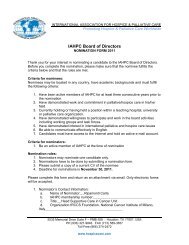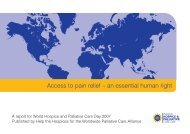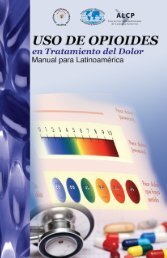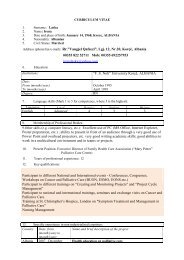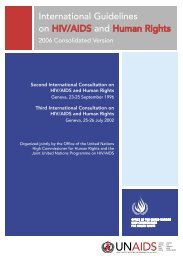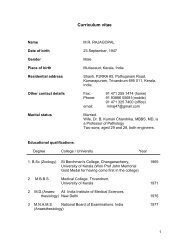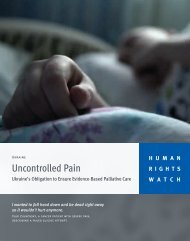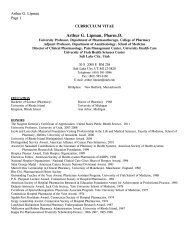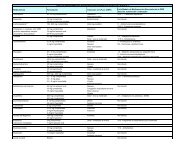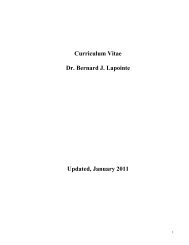INTERIGHTS Bulletin
INTERIGHTS Bulletin
INTERIGHTS Bulletin
Create successful ePaper yourself
Turn your PDF publications into a flip-book with our unique Google optimized e-Paper software.
<strong>INTERIGHTS</strong> <strong>Bulletin</strong><br />
Volume 16 Number 4 2011<br />
181<br />
International<br />
Law Reports<br />
correspondence and to protection of the law against<br />
such interference or attacks – of the ICCPR<br />
L.M.R. v Argentina<br />
Communication no. 1608/2007<br />
Decision of the HRC, 29 March 2011<br />
LMR is a young woman with a permanent mental<br />
impairment, having a mental age between eight and ten<br />
years old. LMR was raped and became pregnant. VDA,<br />
LMR’s mother, sought to have LMR’s pregnancy<br />
terminated. Under Argentine law, an abortion is<br />
permitted if the pregnancy results from the rape of a<br />
woman with a mental disability and the woman’s legal<br />
representative consents.<br />
The staff of the first hospital that LMR visited in June<br />
2006 refused to perform the abortion. VDA took LMR to<br />
a second hospital, SMH, which was willing to perform<br />
the abortion. LMR was almost 15 weeks pregnant at the<br />
time. However, before the procedure could be<br />
performed, the juvenile court issued an injunction<br />
against SMH performing the procedure on the grounds<br />
that a wrongful assault (the rape) could not be repaired<br />
‘with another wrongful assault against a new innocent<br />
victim, i.e. the unborn child’. On 31 July 2006 the<br />
Supreme Court of Justice of Buenos Aires overruled this<br />
decision and held that the abortion could proceed.<br />
Following the Supreme Court’s ruling, SMH came under<br />
enormous pressure from sources opposed to abortion<br />
(including various Catholic groups) and refused to<br />
perform the procedure on the grounds that the<br />
pregnancy was, at that time, too far advanced. LMR<br />
subsequently underwent an illegal abortion.<br />
VDA filed a communication with the HRC on behalf of<br />
LMR alleging that forcing LMR to continue her<br />
pregnancy constituted cruel and degrading treatment in<br />
violation of Article 7 of the ICCPR. The communication<br />
also alleged that, in taking a decision concerning LMR’s<br />
life and reproductive health on LMR’s behalf, Argentina<br />
had arbitrarily interfered in her private life, in violation<br />
of Article 17 of the ICCPR. VDA complained that<br />
Argentina’s failure to safeguard LMR’s legal right to a<br />
procedure required solely by women was discriminatory<br />
conduct in violation of Article 3 of the ICCPR, and that<br />
Argentina had forced LMR to undergo a risky illegal<br />
abortion, in violation of VDA’s right to life. The<br />
communication further alleged that, because Argentina<br />
lacked the mechanism to ensure that LMR could exercise<br />
her legal right to an abortion, Argentina had violated<br />
Article 2 of the ICCPR. Finally, VDA complained that the<br />
failure of Argentina to protect LMR’s rights in the face of<br />
coercion by various Catholic groups was a violation of<br />
Article 18 of the ICCPR.<br />
Argentina conceded that it could be concluded from the<br />
Supreme Court’s ruling that the lower court had possibly<br />
interfered unlawfully with LMR’s right to an abortion in<br />
violation of Article 2. However, Argentina argued that the<br />
judiciary had acted promptly since the matter was<br />
resolved by the Supreme Court in less than four weeks<br />
and that the choice by the hospital not to terminate the<br />
pregnancy was due to the advanced stage of the<br />
pregnancy. Argentina acknowledged that its unlawful<br />
interference, through the judiciary, in an issue that<br />
should have been resolved between LMR and her<br />
physician could be considered a violation of LMR’s right<br />
to privacy in violation of Article 17. Nonetheless,<br />
Argentina argued that forcing LMR to endure a<br />
pregnancy resulting from rape and to undergo an illegal<br />
abortion did not rise to the level of torture or cruel<br />
treatment in violation of Article 7 and that LMR’s<br />
decision to resort to an unsafe abortion was her own<br />
decision, therefore the illegal abortion should not be<br />
considered a direct consequence of state action. Finally,<br />
Argentina contended that it had not committed a<br />
violation of Article 18, in that the activities of the Catholic<br />
groups were unconnected to the actions of state officials.<br />
The Committee held that: (1) there is nothing in the case<br />
file to indicate that LMR’s life was exposed to particular<br />
danger as a result of the illegal abortion, therefore, the<br />
allegation that Argentina violated LMR’s right to life<br />
under the ICCPR is inadmissible; (2) the author has not<br />
adequately substantiated her complaint of a violation of<br />
Article 18, therefore it is inadmissible; (3) Argentina’s<br />
failure to guarantee LMR’s right to an abortion caused<br />
LMR physical and mental suffering in violation of Article<br />
7; (4) Argentina’s unlawful interference through the<br />
judiciary, in an issue that should have been resolved<br />
between the patient and her physician, violated Article<br />
17(1) of the ICCPR; (5) LMR did not have access to an<br />
effective remedy to lawfully terminate her pregnancy in<br />
violation of Article 2(3) in relation to Articles 3, 7 and 17<br />
of the ICCPR; (6) under Article 2(3)(a) of the ICCPR,<br />
Argentina is obligated to compensate LMR and to take<br />
steps to prevent future violations; (7) within 180 days,



